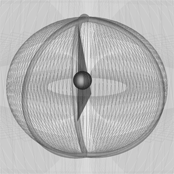



































relational inquiry regarding meaning » intelligibility » activity
• 4E cognition: embodied, embedded, enactive, extended
• Heidegger: how the engaged activity of being-in-the-world holds open aletheia-1, "the thrown-open/dis-closed 'space' that ex-sistence itself is and that makes possible both the intelligibility of things (aletheia-2) and the correctness of propositions (aletheia-3)" (Sheehan [2015] pgs. 74-75).
• participatory knowing—the activity of opening domains of intelligibility
• performative (skillful) and procedural (tacit/implicit) knowledge: know-how—the acivity of skillfully navigating a domain of intelligibility
• Vervaeke, navigating the salience landscape: "...it is rhythmic in nature. You project a salience landscape of how things stand out for you, like the square shape, and then you bind your actions to it, you constrain yourself to only working in the square, but then you break out of that loop, re-project and re-bind yourself to the new salience landscape. It is like breathing..."
_texts
• Csikszentmihalyi, M. (1990) Flow: The psychology of optimal experience [Harper Perennial]
• De Jaegher, H., & Di Paolo, E. (2007) Participatory sense-making: An enactive approach to social cognition [Phenomenology and the Cognitive Sciences 6(4), 485-507]
• Di Paolo, E., & Thompson, E. (2014) The enactive approach. In L. Shapiro, ed. The Routledge handbook of embodied cognition, pp. 68-78 [Routledge]
• Heidegger, M. (1927) Being and Time
• Merleau-Ponty, M. (1945) Phenomenology of perception [C. Smith, trans. Routledge 2005]: "The world is inseparable from the subject, but from a subject which is nothing but a project of the world, and the subject is inseparable from the world, but from a world which the subject itself projects" (499-500).
• Torrance, S., & Froese, T. (2011) An inter-enactive approach to agency: Participatory sense-making, dynamics, and sociality [Humana Mente 15, 21-53]
• Varela, F. J., Thompson, E., & Rosch, E. (1991) The embodied mind: Cognitive science and human experience [MIT Press]—articulating the enactive approach to cognition
